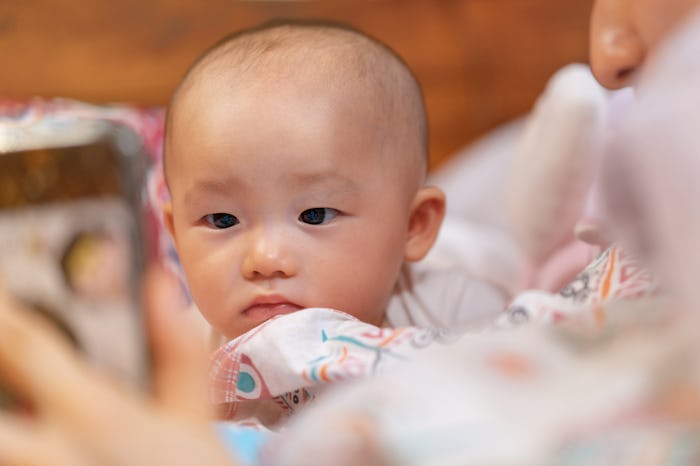Life

Even If Your Baby Can't See FaceTime, It Can Benefit Them In A Cool Way
When you have a baby, one of the first things you're going to want to do is show them off to everyone you know. Once upon a time you would have only been able to do introduce your bundle of joy to those who lived nearby, but FaceTime, Skype, and other video chatting apps have made it so much easier to forge connections with loved ones who don't live locally. While the person on the other end of the phone will love getting to oooh and ahhh over your little one, however, the question of whether your baby can see FaceTime requires a little explanation.
I spoke with Dr. Michael Rich, an associate professor of pediatrics at Harvard Medical School and the founder and director of the Center on Media and Child Health to talk about what FaceTime means to a baby. Since babies can't talk to explain to us exactly what they see, there's a bit of guesswork involved. "We still don’t know… exactly what they can see," says Dr. Rich. Newborn babies can probably only make out light and shapes, according to Baby Center. By around a month old, they'll be able to focus on objects about 12 inches away (so don't hold the phone too close).
But while a baby around a month old should be able to see the phone and look toward it, that doesn't necessarily mean they understand what's going on during a video chat. "It becomes a matter of how well they can translate what they are seeing into a symbol of a three dimensional person," says Rich. Even a baby who can see what's going on probably won't realize that the person on the other end of the phone is a loved one. "First you have to reestablish that real life relationship," Rich says, and ideally, you wouldn't introduce your baby to someone for the first time over a screen. But of course, that's not always possible.
FaceTiming can still be a worthwhile endeavor, though, no matter how much the baby can see or whether they've met the person you're video chatting with before. “The audio is more important early on than the video. Hearing the voice is more of an emotional locator than seeing the face,” Rich says.
Video chatting can also be useful in helping young babies develop their language skills, according to the American Academy of Pediatrics (AAP). While in-person communication is preferred, anything that exposes a child to "back-and-forth conversation" is beneficial. In fact, video chatting is the one exception to the AAP's recommendation for avoiding screen time for babies under 18 to 24 months.
And of course, FaceTime and video chatting aren't just about what the baby gets out of it. “It’s probably much more important for the grandparent bonding with the child than it is for the child bonding with the grandparent,” says Rich. Babies grow so rapidly that seeing it unfold over FaceTime can help out of town loved ones feel more connected to your baby. Someday, it'll work in the other direction, too.